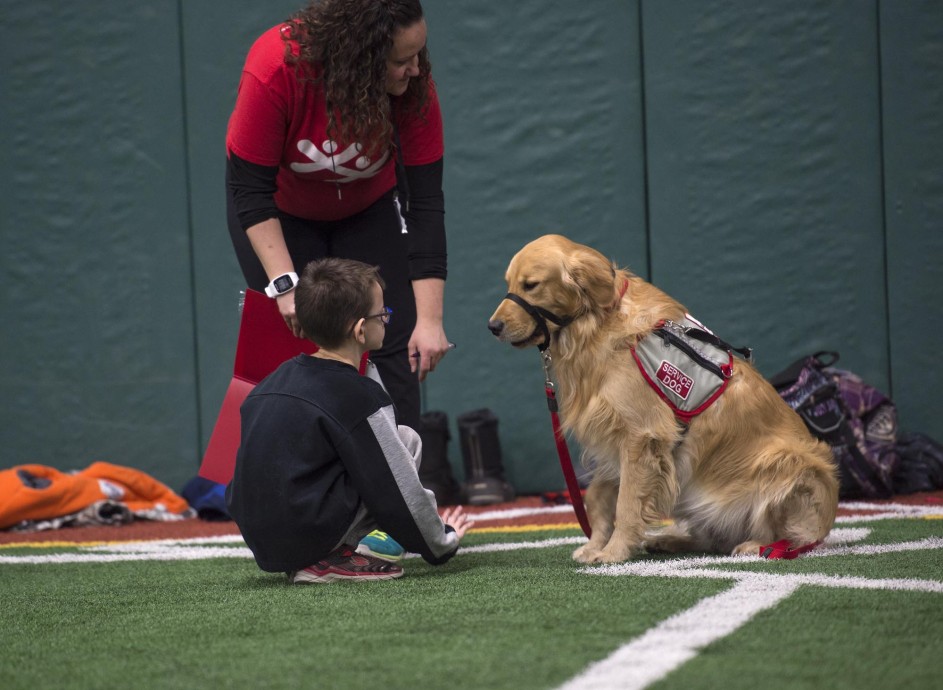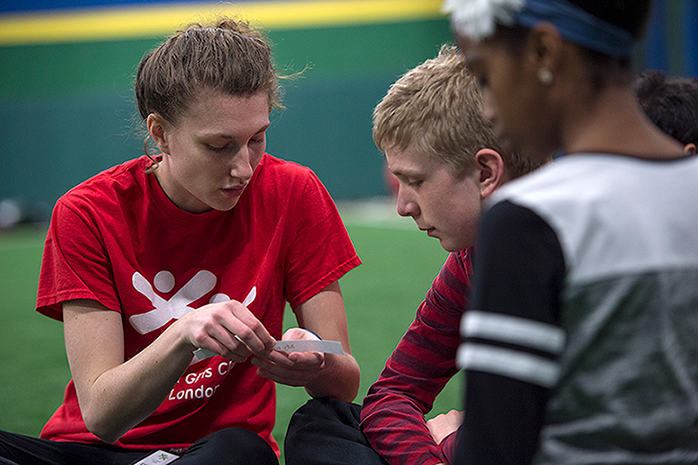Autism and Behavioural Science

*Domestic applicants include Canadian citizens, permanent residents, protected persons and Convention refugees.
Fanshawe’s Autism and Behavioural Science program is about learning skills to teach skills and decrease challenging behaviours for persons with autism and other disabilities.
This one-year Ontario College Graduate Certificate program develops advanced knowledge of Autism Spectrum Disorder (ASD), and awareness of effective intervention techniques via two field placements and academic study. Graduates have highly specialized areas of knowledge in ASD and Applied Behaviour Analysis (ABA) to design and implement behaviour strategies, understand evidence-based treatments for individuals with ASD, collect and analyze data, and work with and train families on implementing behavioural strategies.
Students will learn foundational theories of practice in their first five courses followed by four additional courses in application of theories. You will gain knowledge on the theory of applied behaviour analysis and specifically how to support those with autism and other developmental disabilities. Students will learn to deliver support across all age sectors (children, youth, and adults).
Graduates will be ready to begin careers with your advanced knowledge of autism and awareness of effective intervention techniques from academic study and two field placements. You will be in high demand across the autism sector or, take your experience to new, ever-expanding fields within behaviour analysis.
If you're looking for an online option to achieve your credential, there's an online version of the program (Autism and Behavioural Science, Online). This format is designed for working professionals who need a more flexible schedule that allows the opportunity to complete the graduate certificate in under a year while still working.
Graduates of Fanshawe’s Autism and Behavioural Science program can find employment as instructor therapists with autism services and children's services, autism specialists in service agencies and school boards delivering programs for individuals with autism and private providers of intensive behavioural intervention.
Did you know Fanshawe consistently ranks high in graduation employment rates among large colleges in Ontario?
Here are some examples of career opportunities for graduates of Fanshawe’s Autism and Behavioural Science program:
Instructor Therapist
Responsible for providing direct intervention, implementing programs, recording data and attending clinical team meetings.
Applied Behaviour Analysis (ABA) Educational Assistant
Assists the teacher in devising special strategies to support a student’s needs, interests and abilities.


Fanshawe's Autism and Behavioural Science program gives you the opportunity to extend your knowledge through student placement positions. Applying the principles and techniques learned in the classroom in real-life settings has been the most valuable and rewarding aspect of the program.
The graduate has reliably demonstrated the ability to
1. Assess and analyze the characteristics, skills, and behaviour of individuals with ASD to effectively implement evidence-based behavioural interventions.
2. Design and implement effective behavioural intervention plans under appropriate supervision and based on the principles of Applied Behaviour Analysis (ABA).
3. Evaluate the effectiveness of behavioural intervention plans based on the principles of ABA.
4. Work collaboratively with families, teams, service providers, and the broader community to respond to the learning and behavioural needs of individuals with ASD.
5. Design, implement, and evaluate as part of a team, ABA based transition plans for individuals with ASD.
6. Comply with established ethical principles and professional guidelines
7. Provide leadership in the promotion and provision of services to meet the needs of individuals with ASD and their families.
8. Evaluate empirical evidence in order to select appropriate interventions for individuals with ASD.
Jocelyn Prosser
Applicants whose first language is not English will be required to demonstrate proficiency in English by one of the following methods:
This program has 2 field placements:
- Field Placement 1 (140 hours);
- Field Placement 2 (210 hours).
In order to go on field placement, you are required to complete the following pre-placement requirements:
1. Immunizations
**See Professional
Practice Health Form below to bring to your health
care provider with additional details.
- Tuberculosis
- Mumps, Measles, Rubella
- Varicella
- Tetanus/Diphtheria and Polio
- Pertussis
- Hepatitis B
- Influenza (highly recommended)
2. Standard First Aid Certificate and CPR - Level C
3. Vulnerable Sector Police Check
**Must have been completed within one year of your final day at
field placement
4. Non-Violent Crisis Intervention
List of
acceptable Nonviolent Crisis Intervention certifications available
here
5. Sign Placement Agreement (below)
All certifications must be valid until the last day of your final field placement. A more detailed guide for each section listed is provided below in the Guide to Completing your Professional Practice Requirements.
Once you have gathered the above information, you will be required to upload the documents and meet with a health professional to get the documents verified. To complete this, book an appointment with Synergy Verified:
1. Please visit https://verified.sgappserver.com/
2. Click "Forgot Password"
3. Use your FOL email address to change your password
**If you continue to have issues, please reach out to www.synergyhelps.com.
Deadlines:
- October 15 for AUT1 students;
- Or at least four weeks before you begin your field placement (for part-time students).
- December 1 for AUT3 students.
| Level 1 | ||||
| Take all of the following Mandatory Courses: | ||||
| BSCI-6001 | Applied Behaviour Analysis Intro | 4 | ||
| This course introduces the student to the principles of Applied Behaviour Analysis (ABA), which is the basis for Intensive Behavioural Interventions (IBI). In addition to basic terminology, students will learn when and how to use these techniques appropriately. Students will also learn how to access and interpret journal publications in the field of autism and Applied Behaviour Analysis. | ||||
| BSCI-6002 | Autism Spectrum Disorder (ASD) | 3 | ||
| This course examines Autism Spectrum Disorder (ASD) according to core features and diagnostic criteria. This course provides an introduction to a neurodevelopmental and behavioural understanding of individuals with ASD. | ||||
| BSCI-6012 | Specialized Instructional Strategies | 4 | ||
| This course introduces the student to common evidence-based behavioural approaches applied in teaching individuals with autism new skills with an emphasis on strategies for teaching language, academic skills, activities of daily living, play skills, and social skills. Topics will be approached by providing the student with an understanding of the terms used, a description of the teaching techniques characterized in each of the modules (where applicable) and a basic understanding of the conceptual elements motivating the approaches. Topics will include traditional discrete trial training protocols, protocols developed based on Skinner's analysis of Verbal Behaviour, Precision Teaching, Direct Instruction, Pivotal Response Training, Augmentative and Alternative Communication, and Incidental and Natural Environment Teaching. | ||||
| BSCI-6004 | Working With Families & Teams | 3 | ||
| This course presents the student with theories, terminology and applications underlying current approaches to teamwork and working with the families of individuals with Autism Spectrum Disorder (ASD). The focus will be on effective collaboration with a multi-disciplinary team, which is essential to successful Applied Behaviour Analysis (ABA). Students will develop the interpersonal, job-oriented skills necessary to problem-solve as team members in a flexible, empathetic, resourceful, and productive manner. | ||||
| BSCI-6013 | Ethics & Professionalism | 2 | ||
| This course will introduce the foundations of ethical thinking and will review the different perspectives and rationale for ethical decision-making within a behavioural framework.Students will be introduced to professional codes of ethics that are essential for ethical practice. They will learn how to think critically and apply general ethical principles to particular situations through the use of case studies, practice vignettes, structured exercises, and group discussions.This course will provide participants with the basis for developing ethical guidelines for practice, examining areas related to legislative acts, an overview of the Professional and Ethical Compliance Code for Behaviour Analysts the ONTABA/ABA standards of practice. Students will also learn how to evaluate their own professional expertise and limitations for ongoing professional development planning. | ||||
| FLDP-6004 | Field Placement 1 | 3.6 | ||
| This course will provide a practical opportunity to demonstrate some of the vocational outcomes below. The placement will consist of 140 hours of participation in an ABA program for individuals with ASD. The student will develop technical skills through application of their knowledge gained in the prerequisite courses. Students will also have the opportunity to observe and practice the ethical application of behavioural principles/techniques. | ||||
[1] Total program costs are approximate and subject to change. They do not include additional fees such as the health and dental plan, bus pass, or general expenses. Learn more about ancillary and additional fees.